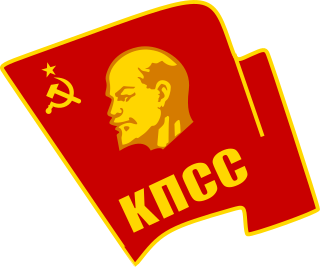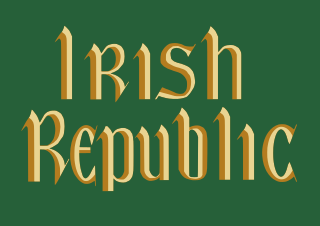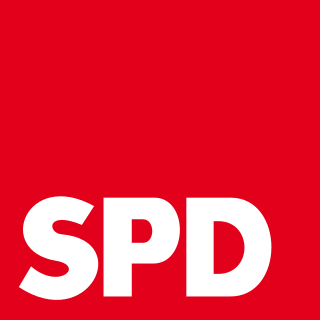Related Research Articles

The Bundestag is the German federal parliament. It is the only federal representative body that is directly elected by the German people. It is comparable to the United States House of Representatives or the House of Commons of the United Kingdom. The Bundestag was established by Title III of the Basic Law for the Federal Republic of Germany in 1949 as one of the legislative bodies of Germany and thus it is the historical successor to the earlier Reichstag.

The Bolsheviks, also known in English as the Bolshevists, were a far-left, revolutionary Marxist faction founded by Vladimir Lenin that split with the Mensheviks from the Marxist Russian Social Democratic Labour Party (RSDLP), a revolutionary socialist political party formed in 1898, at its Second Party Congress in 1903.

The Chinese Communist Party (CCP), officially the Communist Party of China (CPC), is the founding and sole ruling party of the People's Republic of China (PRC). Under the leadership of Mao Zedong, the CCP emerged victorious in the Chinese Civil War against the Kuomintang, and, in 1949, Mao proclaimed the establishment of the People's Republic of China. Since then, the CCP has governed China with eight smaller parties within its united front and has sole control over the People's Liberation Army (PLA). Each successive leader of the CCP has added their own theories to the party's constitution, which outlines the ideological beliefs of the party, collectively referred to as socialism with Chinese characteristics. As of 2022, the CCP has more than 96 million members, making it the second largest political party by party membership in the world after India's Bharatiya Janata Party. The Chinese public generally refers to the CCP as simply "the Party".

The Communist Party of the Soviet Union (CPSU), also known by various other names during its history, was the founding and ruling party of the Soviet Union. The CPSU was the sole governing party of the Soviet Union until 1990 when the Congress of People's Deputies modified Article 6 of the 1977 Soviet Constitution, which had previously granted the CPSU a monopoly over the political system. The party has its roots in the Russian Social Democratic Labour Party (RSDLP). The RSDLP was founded in 1898, when Russia was ruled by an absolute monarchy. The broad anti-Tsarist ideology was the driving factor in its initial growth. Russians across the political spectrum flocked to the party, as Marxists, socialists, and centrists made up its ranks. Despite the Tsar's harsh oppression including imprisoning and even executing party members, the RSDLP continued to grow, albeit underground. Initially the party operated in a unified and cohesive manner, but by 1900 cracks within party unity began to show.

The House of Commons is the lower house of the Parliament of the United Kingdom. Like the upper house, the House of Lords, it meets in the Palace of Westminster in London, England. The House of Commons is an elected body consisting of 650 members known as members of Parliament (MPs). MPs are elected to represent constituencies by the first-past-the-post system and hold their seats until Parliament is dissolved.

The Nazi Party, officially the National Socialist German Workers' Party, was a far-right political party in Germany active between 1920 and 1945 that created and supported the ideology of Nazism. Its precursor, the German Workers' Party, existed from 1919 to 1920. The Nazi Party emerged from the extremist German nationalist, racist and populist Freikorps paramilitary culture, which fought against the communist uprisings in post–World War I Germany. The party was created to draw workers away from communism and into völkisch nationalism. Initially, Nazi political strategy focused on anti–big business, anti-bourgeois, and anti-capitalist rhetoric. This was later downplayed to gain the support of business leaders, and in the 1930s, the party's main focus shifted to antisemitic and anti-Marxist themes. The party had little popular support until the Great Depression.

A political party is an organization that coordinates candidates to compete in a particular country's elections. It is common for the members of a party to hold similar ideas about politics, and parties may promote specific ideological or policy goals.

Sinn Féin is an Irish republican and democratic socialist political party active throughout both the Republic of Ireland and Northern Ireland.

The United Kingdom is a unitary state with devolution that is governed within the framework of a parliamentary democracy under a constitutional monarchy in which the monarch, currently Charles III, King of the United Kingdom, is the head of state while the Prime Minister of the United Kingdom, Rishi Sunak, is the head of government. Executive power is exercised by the British government, on behalf of and by the consent of the monarch, and the devolved governments of Scotland, Wales and Northern Ireland. Legislative power is vested in the two chambers of the Parliament of the United Kingdom, the House of Commons and the House of Lords, as well as in the Scottish, Northern Irish and Welsh parliaments.

The Libertarian Party (LP) is a political party in the United States that promotes civil liberties, non-interventionism, laissez-faire capitalism, and limiting the size and scope of government. The party was conceived in August 1971 at meetings in the home of David F. Nolan in Westminster, Colorado, and was officially formed on December 11, 1971, in Colorado Springs, Colorado. The organizers of the party drew inspiration from the works and ideas of the prominent Austrian school economist, Murray Rothbard. The founding of the party was prompted in part due to concerns about the Nixon administration, the Vietnam War, conscription, and the introduction of fiat money.
The Conservative Party, officially the Conservative and Unionist Party and also known colloquially as the Tories, is one of the two main political parties in the United Kingdom, along with the Labour Party. It is the current governing party, having won the 2019 general election. It has been the primary governing party in the United Kingdom since 2010. The party is on the centre-right of the political spectrum, and encompasses various ideological factions including one-nation conservatives, Thatcherites, and traditionalist conservatives. The party currently has 356 Members of Parliament, 264 members of the House of Lords, 9 members of the London Assembly, 31 members of the Scottish Parliament, 16 members of the Welsh Parliament, 2 directly elected mayors, 30 police and crime commissioners, and around 6,654 local councillors. It holds the annual Conservative Party Conference.

The speaker of the United States House of Representatives, commonly known as the speaker of the House, is the presiding officer of the United States House of Representatives. The office was established in 1789 by Article I, Section 2 of the U.S. Constitution. The speaker is the political and parliamentary leader of the House and is simultaneously its presiding officer, de facto leader of the body's majority party, and the institution's administrative head. Speakers also perform various other administrative and procedural functions. Given these several roles and responsibilities, the speaker usually does not personally preside over debates—that duty is instead delegated to members of the House from the majority party—nor regularly participate in floor debates.

The Social Democratic Party of Germany is a centre-left social democratic political party in Germany. It is one of the major parties of contemporary Germany.

The Indian National Congress (INC), colloquially the Congress Party but often simply the Congress, is a political party in India with widespread roots. Founded in 1885, it was the first modern nationalist movement to emerge in the British Empire in Asia and Africa. From the late 19th century, and especially after 1920, under the leadership of Mahatma Gandhi, the Congress became the principal leader of the Indian independence movement. The Congress led India to independence from the United Kingdom, and significantly influenced other anti-colonial nationalist movements in the British Empire.
A whip is an official of a political party whose task is to ensure party discipline in a legislature. This means ensuring that members of the party vote according to the party platform, rather than according to their own individual ideology or the will of their donors or constituents. Whips are the party's "enforcers". They try to ensure that their fellow political party legislators attend voting sessions and vote according to their party's official policy. Members who vote against party policy may "lose the whip", being effectively expelled from the party.

The Samajwadi Party is a socialist political party in India, headquartered in New Delhi but mainly based in Uttar Pradesh, with significant presence in other states as well. With a secular and democratic ideology, the Samajwadi Party believes in creating a socialist society, which works on the principle of equality. The party has been able to form the government in the state of Uttar Pradesh for four times - three times under Chief Minister Mulayam Singh Yadav, the fourth and recent being Chief Minister Akhilesh Yadav’s full majority government in 2012-2017 Uttar Pradesh Legislative Assembly. The coalition of party and it’s alliance partners SP+ has one of the largest vote base in the state of Uttar Pradesh in terms of collective voting pattern in the state-based electoral system, with more than 37% vote share in 2022 elections.
An independent or non-partisan politician is a politician not affiliated with any political party or bureaucratic association. There are numerous reasons why someone may stand for office as an independent.
The Labour Party is a political party in the United Kingdom that has been described as an alliance of social democrats, democratic socialists and trade unionists. The Labour Party sits on the centre-left of the political spectrum. In all general elections since 1922, Labour has been either the governing party or the Official Opposition. There have been six Labour prime ministers and thirteen Labour ministries. The party holds the annual Labour Party Conference, at which party policy is formulated.

The United States House of Representatives is the lower chamber of the United States Congress, with the Senate being the upper chamber. Together they comprise the national bicameral legislature of the United States.

The Black Panther Party (BPP), originally the Black Panther Party for Self-Defense, was a Marxist-Leninist and black power political organization founded by college students Bobby Seale and Huey P. Newton in October 1966 in Oakland, California. The party was active in the United States between 1966 and 1982, with chapters in many major American cities, including San Francisco, New York, Chicago, Los Angeles, Seattle, and Philadelphia. They were also active in many prisons and had international chapters in the United Kingdom and Algeria. Upon its inception, the party's core practice was its open carry patrols ("copwatching") designed to challenge the excessive force and misconduct of the Oakland Police Department. From 1969 onward, the party created social programs, including the Free Breakfast for Children Programs, education programs, and community health clinics. The Black Panther Party advocated for class struggle, claiming to represent the proletarian vanguard.